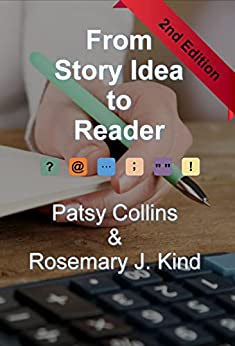There's loads of advice about things which will help you as a reader. Lots of it is excellent. This book for example is jolly good. And this one is full of ideas (the seeds of a story!) – but just for a change this post focuses on things you don't need.
1. A qualification.
It helps if you can spell, and have a grasp of punctuation and grammar – and know interesting stuff you can include in your work. It doesn't matter whether you learned this in a formal way and have a piece of paper to prove it, if you picked it up as you went along, or even if you're still learning. You can still write.
I'm in no way criticising those who do have qualifications (I'm very proud of my grade B 'O' level in English language). Nor am I suggesting it would be a mistake to enrol in an academic course in the future if you'd like to - I just don't believe anyone needs a qualification in order to write.
2. Lots of free time.
Writing does take up some time. Ok, lots if you're going to complete a book or attempt to earn enough to keep you in biscuits, but you don't need a whole day or even several free hours at a time. The majority of writers started when they had full time jobs, young children to care for, or other commitments. Getting up twenty minutes earlier to write, writing for half your lunch break, or instead of watching one TV programme each week will give you at least a couple of hours every month.
3. To be able to type 'properly'.
There's absolutely nothing wrong with learning, or using this skill if you have it, but it's not vital. I use one finger and my thumb. I've written hundreds of short stories, six novels, lots of blog posts and plenty of other stuff. Some people aren't physically able to type in the usual way, or at all, but still write.
4. A dedicated writing space.
Yes, I know I have the wonderful mobile writing retreat. I love it, but I'd still write without it. My first few published stories were written on kitchen tables and the landing in a friends' house. If you don't have space at home you could write in the library, a cafe, at work, in the bus station ...
5. Money and equipment.
We all need money to live, but writing needn't be a further expense.
A computer of some kind helps enormously and is necessary if you wish to submit work, but it doesn't need to be new or even yours. Libraries provide free computer equipment, so do some charities. A friend or employer might allow you to use theirs.
6. To read.
It is possible to write without reading, but I don't advise it. If you don't read the kind of work you want to write how will you know what readers expect, what's been done to death and where there are gaps in the market?
If you don't love the written word, why would you want to create more of it?
7. Routines, dedication and discipline.
Trust me, if these things were essential I'd never have written anything. In order to be even moderately successful you will need to put in some effort, but writing doesn't need to be your top priority or done at a certain time each day / week.
That's not to say that a routine and consistent, professional approach are bad. They're not – quite the opposite in fact. However if you have other commitments or distractions you must or chose to spend time on, take breaks from your writing, or have a disrupted or non existent schedule, you can still be a writer.
8. Luck, contacts, fame, influence and magic.
These can be hugely helpful in achieving sales and other success (more so in some areas than others) but you don't need them for the actual writing part.
9. To have a blog or website, be on social media or create a platform.
See above!
10. Cake.
I know it's hard to believe, but it's true. At times I've gone days without the stuff and still produced readable work. You will of course need an alternative – cookies, scones, flapjack, biscuits, cheese, chocolate, even fruit can work.
Do you agree with me? Are there things you've been told are essential for writers but which you manage without?






























